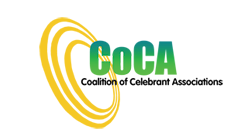2. CoCA’s primary aim is to engage effectively with the Attorney-General and the Attorney-General’s Department (AGD) to represent the marriage celebrant community on matters relating to the Marriage Celebrants Program (the Program). In doing so, CoCA will work to ensure that it represents the views of those marriage celebrants who are members of celebrant associations, as well as those who are not.
3. The relevant area of AGD is the Marriage Celebrants Section, Marriage and Intercountry Adoption Branch, Access to Justice Division.
Purpose of the Protocol
4. CoCA and AGD wish to form a productive and collaborative relationship, characterised by constructive and, wherever possible, open communication. To facilitate this relationship, this Protocol has been developed to ensure a clear understanding of how CoCA and AGD will work together, communicate with each other and clarify expectations as to roles.
5. While this Protocol is limited to CoCA and AGD, it is acknowledged that the Attorney-General is the final decision-maker in matters relating to the Program and therefore plays an important role in seeking and considering CoCA’s feedback or concerns.
6. AGD acknowledges that CoCA members provide their valuable time and input on a voluntary basis. CoCA members meet their own expenses for travel and accommodation, noting that CoCA hopes that AGD will be able to make funding available in the future.
7. CoCA acknowledges that as an Australian Government department, AGD must prioritise the needs of the Attorney-General and AGD’s statutory obligations under the Marriage Act 1961 and Marriage Regulations 1963.
Key Contacts
8. CoCA and AGD have each nominated a contact person to be responsible for the implementation and monitoring of the Protocol.
9. Communication between CoCA and AGD should also be directed to the contact person in the first instance.
10. The nominated contact person for CoCA is:
The Secretary Coalition of Celebrant Associations
11. From time to time, CoCA may also appoint sub-committee convenors to represent CoCA in discussions with AGD on particular subject areas (eg training of marriage celebrants, Ongoing Professional Development (OPD)). CoCA will advise AGD where this is the case.
12. The nominated contact person for AGD is:
Assistant Secretary, Marriage and Intercountry Adoption Branch
13. If a change is made to the contact person, the details of the new contact person will be provided as soon as possible.
Information Sharing and Consultation
14. CoCA and AGD will share relevant information with the aim of greater consultation on matters relevant to the Program and the facilitation of a closer more effective working relationship.
15. CoCA will endeavour to keep AGD appropriately informed about and consult on:
(a) current issues or problems arising in the Program for marriage celebrants
(b)proposals from marriage celebrants and other stakeholders on matters that may improve the operation of the Program
(c)submissions that CoCA wishes to make to the Attorney-General
(d)specific consultations with CoCA members on specific subject areas (eg training and OPD), and
(e) any other relevant matters concerning marriage celebrants or the Program.
16. Subject to paragraphs 17 and 18, AGD will endeavour to keep CoCA appropriately informed about and consult on:
(a) changes to the Program aims, objectives or operation (whether legislative or otherwise)
(b)broader matters that may impact on the Program or marriage celebrants
(c) planning or review process and timelines, and
(d)opportunities for input and consultation.
17. There will be occasions where AGD shares information with CoCA delegates that is considered sensitive. In such cases, AGD will request that the information be treated confidentially and AT Assistant Director not circulate it outside CoCA delegates. Otherwise, information shared with CoCA delegates may be circulated more widely.
18. There are restrictions placed on AGD on its ability to share particular information. For example:
(a) unless approved by the Prime Minister, Cabinet or the Governor-General, proposed amendments to the Marriage Act or Regulations
(b)information that would breach an Information Privacy Principle contained in the Privacy Act 1988, or
(c) advice provided to government where a decision or view of the Attorney-General or Cabinet is pending (eg budget matters).
Regular CoCA–AGD Meetings
19. A minimum of two CoCA–AGD meetings will be held at AGD in Barton each year. Each of the meetings will run a full day (ie 10am–4pm) to allow full discussion of issues. AGD will arrange a Departmental meeting room and catering for these meetings. Otherwise, attendees will meet their own costs.
20. In addition, AGD will also make available a Departmental meeting room for the day prior to or after the CoCA–AGD meetings should CoCA wish to hold a closed meeting (ie CoCA members only).
21. There is a high demand for the Departmental meeting rooms. Meeting dates may therefore need to be arranged around meeting room availability.
Attendance of the Attorney-General
22. The Attorney-General will be invited to attend the CoCA–AGD meetings. The Attorney-General’s availability may be limited given other commitments. AGD will liaise with the Attorney-General’s Office in this regard.
Meeting Agenda and Papers
23. After inviting agenda items from CoCA, AGD will prepare the meeting agenda and circulate to CoCA prior to the meeting. Both CoCA and AGD will endeavour not to add late items.
24. As far as possible, any agenda or discussion papers should be provided at least two weeks before the meeting. Doing so will allow consideration of the item to occur before the meeting so that meeting discussion is more productive.
Meeting Chair
25. AGD will Chair the full day CoCA–AGDmeetings,unless otherwise agreed.
Meeting Summary
26. AGD will preparea Meeting Summary tor record key areas of discussionaa and agreement from the CoCA–AGD meetings. The Meeting Summary is not intended to be a verbatim or comprehensive reflection of discussion.
27. AGD will endeavour to provide a draft Meeting Summary to CoCA with in four weeks oft he CoCA–AGD meeting for consideration and comment. CoCA will endeavour to provide any comments on the draft within two weeks of receipt of the draft so that the Meeting Summary can be finalised. If there is a delay in AGD providing the draft or CoCA providing comments on the draft, the key contacts will be notified.
Additional CoCA–AGD Meetings
28. Additional meetings may be held with the agreement of CoCA and AGD,noting that teleconferences between the CoCA Executive (or selected members) and AGD may be a way of managing ad hoc issues without incurring additional costs.
Effectiveness of the Protocol
29. CoCA and AGD will share feedback about the operation of the Protocol on an ongoing basis. This may include the need for a partial review of the Protocol once the CoCA–AGD relationship is better established, or consideration of whether a full review of the Protocol is required.
30. CoCA and AGD may also make amendments to the Protocol by mutual agreement. Variations to the Protocol may be settled by an exchange of e-mails.
Agreement to the Protocol
31. Agreement to the Protocol may be settled by signature or an exchange of e-mails.
Agreed: 10 December 2010, as confirmed by later exchange of e-mails.
Amended: 25 September 2014.
Protocol between CoCA and Attorney General’s Department
This protocol was replaced in July 2019 by the Attorney General's Department in 2019 with the Meeting Administration Document.
Background to the Protocol
1. With the support of the Attorney-General, the Coalition of Celebrant Associations (CoCA) was established on 16 October 2008 as the peak representative body for Commonwealth-registered marriage celebrants.

